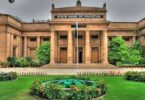Monitoring Desk
ISLAMABAD: The prices of essential food items including fruits and vegetables have jumped over 20 percent in open market, retailers and the government’s bureau of statistics said on Tuesday, hoping to see a decline in the rates in the coming weeks owing to major cuts in petroleum prices and interest rate in Pakistan.
The food prices usually go up during Ramadan since families buy fruits and other essential items in bulk to break their fast and distribute them among the underprivileged. This year, however, the inflationary pressure in the economy has hit daily wage earners and blue collar workers particularly hard since many of them have already lost work due to the coronavirus pandemic and the ensuing lockdowns.
“We can only see fruits and vegetables from afar,” Muhammad Bashir, a laborer, told Arab News. “I’d be a happy person if I can buy only wheat flour and some lentils to feed my family in these testing times.”
The country’s consumer price inflation eased to 8.5 percent in April from 10.24 percent in March, a sharp decline from 14.56 percent in January this year. This has still resulted in squeezing of household budgets as the South Asian nation of 210 million people struggles to keep the economy afloat amid virus lockdowns.
Pakistan has reported 21,494 COVID-19 cases with 486 related deaths since February 26 when the country reported its first case. The government has also initiated numerous measures in response, including testing and tracing of suspects, establishment of large quarantine centers along with closure of industry and public transport which has contributed to hindrance in mobility and unemployment.
“Panic buying and increased gap between supply and demand has resulted in price escalation of some grocery items,” Farid Qureshi, secretary-general of Karachi’s retail grocers’ association, told Arab News.
The transportation charges have also increased due to the lockdown, he said, urging the government to allow public transport to help bring down the prices of edible and non-edible items.
“Once the lockdown is lifted and public transportation becomes functional, the prices will definitely come down,” Qureshi said.
The prices of fresh fruits increased by 17.71 percent, pulse masoor by 27.54 percent, beans by 4.72 percent, eggs by 14.71 percent and sugar 2.55 percent in April as compared to the previous month, according to the Pakistan Bureau of Statistics.
On the other hand, the country’s central bank has cut the interest rates from 13.25 percent in January to 9 percent in recent weeks to help boost the dwindling economy and bring down the inflation rate. The government has reduced petrol and diesel prices by 27 percent and 35 percent respectively for this month to provide relief to people who have suffered major losses to their income stream due to the pandemic.
“We are trying our best to provide maximum relief to people through cut in interest rates and petroleum prices despite a slump in the economy,” Musarrat Cheema, a spokesperson for the Punjab government, told Arab News.
She said the government had constituted price committees and authorized price magistrates at district and tehsil level to conduct raids against hoarders and profiteers. “Millions of rupees of fines have been imposed so far on profiteers,” she said while urging the public to cooperate with the government by complaining against mafias that try to increase the rates of essential food items.
Courtesy: (Arabnews)






